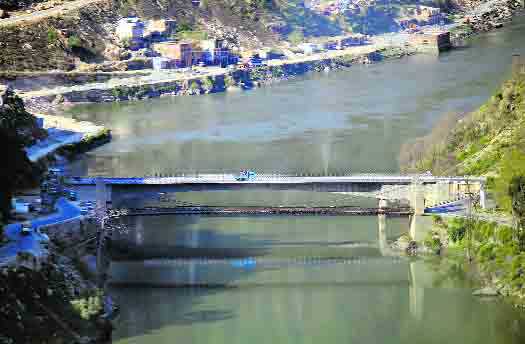All kinds of wars and ways to avoiding wars can turn facts upside down; suspicions can blunt logic as people are only fed to believe what they should. And this can be so starkly ugly: Rivers in J&K, if fully harnessed on this side of the border, can parch Pakistan, a few kilometers from us. To win an argument, we can do it. Look at it from the other side: all attempts are made to hold India to ransom by denying it the right to build dams on the premise that Kashmir is a “disputed territory”. No prizes for guessing that it’s the people who have suffered, on both sides. Going by the war rhetoric, is it time to revise our argument?
The official position is: Indus commissioners from India and Pakistan have met at least twice a year since the treaty was signed in 1960, even during the 1965, 1971 and Kargil wars. New Delhi says they would now meet only in the absence of terrorism. The treaty provides for three-stage grievance redress: first, a dispute is taken up at meetings. If unresolved, it is referred to a neutral expert the World Bank (that had brokered the pact) appoints. If that too fails, both sides can apply for arbitration by the UN’s court of arbitration. Right now, Pakistan appears at a disadvantage because the first two clauses haven’t been gone through. The Indus Water Treaty (IWT) is widely perceived as a discriminatory agreement leaving water-rich J&K without any control of its natural resources.
The agreement signed in Karachi on September 19, 1960 by then Prime Minster Jawaharlal Nehru and Pakistan's President General Ayub Khan was a World Bank-sponsored treaty after years of negotiations. The Indus system of rivers comprises three western rivers the Indus, Jhelum and Chenab passing through J&K and three eastern rivers — the Sutlej, Beas and Ravi (from Indian Punjab). India controls rivers in Punjab but Pakistan has de fecto control of rivers flowing through J&K.
Not fully harnessed
An estimated 16, 475 MW of hydro potential has been identified on rivers of J&K but so far only 3,263.46 MW has been harnessed while several of the projects are yet to take off and are running behind schedule with the treaty being one of the factors. It is estimated that the state has suffered over Rs 20,000-crore losses due to the treaty which puts a rider on exploitation of water from three rivers flowing to Pakistan.
It is this mandate of the IWT which has allowed Pakistan to scuttle hydro-electric projects in J&K by creating a controversy over their design, height and spillways of the proposed dams. For decades political parties in power National Conference (NC) and later Peoples Democratic Party (PDP) have been demanding that India should either scrap the treaty or compensate the state for the losses suffered from the day treaty was signed. The J&K Assembly in 2002 had passed a resolution for termination of the treaty Arm-twisting
Since the insurgency, Pakistan through its proxies used terror as a tool to stop work on various hydel projects during 1990’s. It used its insurgent outfits to abduct two Swedish engineers, Jan Ole Loman and Johan Jansson, who were working at the Uri hydro electric projects in the winters of 1991. Then, again in 1992, Pakistan sponsored militants abducted a French engineer Silva Antonia working on Dul Hasti power project in the state.
Work on the construction of navigation lock-cum-control structure (Tulbul navigational project) at the mouth of Asia’s largest fresh water lake, Wullar Lake in Sopore is yet to be completed. Started in 1984 in order to raise the level of water for facilitating transport on the Jhelum in Kashmir Valley during winter months was stopped in 1988 under pressure from the Benazir Bhutto government. The work restarted after 2009 but in April 2012 militants, some of them foreigners, blasted a portion of the under-construction barrage. The completion would have allowed year-round navigation from Anantnag to Srinagar and Baramulla.
Unlock Exclusive Insights with The Tribune Premium
Take your experience further with Premium access.
Thought-provoking Opinions, Expert Analysis, In-depth Insights and other Member Only Benefits
Already a Member? Sign In Now










